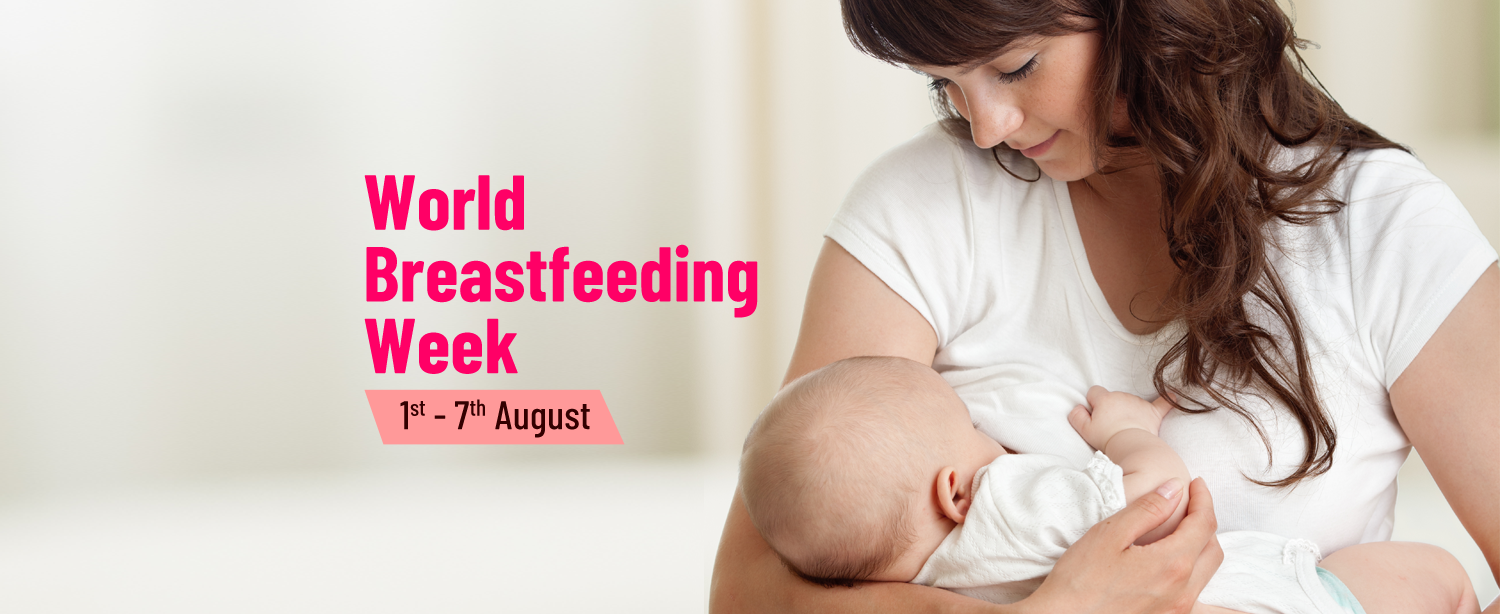Are you a first-time mother? Motherhood is a roller coaster ride of emotions: you’re pleased and happy for your baby’s arrival, but you’re also fatigued, sleep-deprived, and overwhelmed by your new routine. The challenges of motherhood often replace the challenges of pregnancy. The mental and physical trauma of a difficult labor, lack of sleep and difficulty breastfeeding can take a toll on your health. The World Breastfeeding Week 2021 aims to encourage and support breastfeeding mothers and babies. Let us protect breastfeeding and consider it a shared responsibility. Good nutrition, adequate sleep, help from family and lactation experts are the key to a successful breastfeeding journey.
While many women believe that nursing comes easy to everyone, this isn’t always the case. Hectic lifestyles, poor work-life balance, stress, and unhealthy food plans are just a few of the variables that might make nursing difficult. However, with the right support and guidance you can overcome the initial breastfeeding challenges. Persistence and patience will help you sail through the breastfeeding journey smoothly.
Successful Breastfeeding
Here is a look at some useful tips from experts that help start a fulfilling breastfeeding journey:
- Breastfeed within 1 hour of birth
- Reduce your stress levels
- Eat a nourishing diet
- Rest well
- Stay hydrated
- Keep trying and do not lose hope
- Ask for help
While it’s fine to ask your friends and family for advice, don’t compare your breastfeeding experience to theirs. Every woman is different, and your ability to breastfeed is influenced by numerous factors.
Benefits of Breastfeeding – Mother & Baby
Breast milk is the best food for babies in the first year of life. Here are a few health benefits for babies:
- Breast milk has hormones and the right amount of protein, sugar, fat and most vitamins to help your baby grow and develop.
- It has antibodies that help protect your baby from many illnesses like ear, respiratory or diarrhoeal infections.
- Breast milk is easy to digest reducing the risk of colic, gas and digestive discomfort in babies.
- Breast milk has fatty acids, like DHA (docosahexaenoic acid), that may help your baby’s brain and eyes develop.
- Breastfeeding can reduce your baby’s risk for sudden infant death syndrome (also called SIDS).
- Breast milk changes as your baby grows giving your baby the right nutrition at the right time. The initial days after giving birth, your breasts make a thick discharge known as colostrum – this is highly nutritious and fully of antibodies for your new born. After a few days it changes to breast milk.
Know How Breastfeeding Benefits New Moms:
- It increases the amount of oxytocin hormone that helps your uterus contract.
- It burns extra calories helping you get back to your pre-pregnancy weight.
- It may help lower your risk for diabetes, breast cancer and ovarian cancer.
- It can help you bond with your baby.
Most Common Breastfeeding Problems
Most women experience some breastfeeding discomfort during the initial days. Most of them can be easily solved with timely guidance. Here are the most common obstacles:
- Breast infections:
An infection is often characterized by a lump or soreness in the breast tissue. Mothers can experience yellowish discharge from the nipples, as well as flu-like symptoms such as nausea, vomiting and body aches. The breasts can also be warm or hot to the touch. If the pain and fever persists, contact your doctor for further assistance. - Cracked or sore nipples:
Improper positioning and poor latching can lead to cracked or sore nipples. Try changing your nursing position or using a topical cream to alleviate pain. - Engorgement:
This is a build-up of milk can cause your breasts to become hard and painful. Mothers should stay on a regular schedule to empty breasts, expelling milk through a pump or manually. Also, placing a warm or cool compress on the breast will encourage blood flow and reduce soreness. - Latching issues:
A child may frequently latch-on and let go of the breast or resist nursing all together. When a baby is unable to remove milk from the breast, it can result in low weight and a significant drop in milk production. Meet a lactation consultant for further help. - Leaking:
An inconsistent feeding routine can lead to unexpected leakage. This occurs when milk is released without stimulation from a child. Try to follow a regular feeding schedule and use disposable nursing pads if required. - Plugged ducts:
When a milk duct fails to drain properly, it can become inflamed and clogged with fluid. Frequent breastfeeding (up to every two hours), can relieve pressure from the affected duct. Also, be sure to massage the area and wear loose comfortable clothes.
Breastfeeding Support
Do you have trouble with correct latching, suffer from pain during nursing or have other doubts? Help from medical professionals can be invaluable for breastfeeding. Don’t give up, but get informative and comforting guidance from an expert. Meet highly experienced lactation consultants at our Centre for Mother & Child. Our team offers supportive guidance to breastfeeding mothers online and offline. Please find below link for further information:
https://www.kokilabenhospital.com/departments/centresofexcellence/centrefor_motherchild.html


